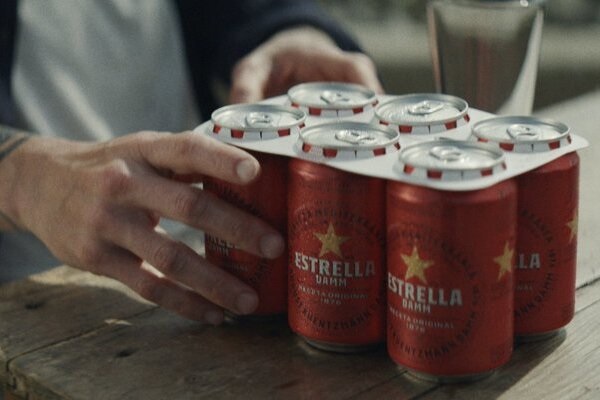Estrella Damm announces the end of plastic pack rings in new advertising campaign

“Act III. Commitment ”, the new Mediterráneamente campaign, continues last summer’s message about the need to protect the Mediterranean
At the end of July, Estrella Damm will begin to replace plastic can pack rings with 100% biodegradable cardboard packaging, completely ending the use of plastic rings in December this year. This is the final message of “Act III. Commmitment”, the new Mediterráneamente advertising campaign, which, carrying on from last summer’s message, aims to raise awareness about the need to protect the Mediterranean.
The advertisement’s powerful modern choreography, performed by 24 dancers, represents how, working together towards a common goal, we can protect our planet. It calls out to each and every one of us and the small things we can do in our daily lives to help end the environmental crisis that the Mediterranean coast is facing and which is putting its biodiversity at risk. Because "Defending the way you live is a beautiful way to live."
“Commitment” continues the brand’s aim, which began with last year’s “Soul” and “Lovers” campaigns, of raising awareness about the Mediterranean’s environmental problems and of the urgent need to protect it. This year the brand reinforces this message with its commitment to ending the use of plastic beer can pack rings. Continuity also comes from the the music that accompanies this third act, once again written by Joan Dausà and performed this time by Magalí Sare. The chorus “There must be another way of living” is the thread that connects the three campaigns.
Like its predecessors, “Act III. Commmitment” is based on an original idea by Oriol Villar and directed by Nacho Gayán.
Ending the use of plastic can pack rings
In 2019, Estrella Damm started a pioneering project within the brewing industry with the aim of ending the use of plastic beer can pack rings. This initiative has come to fruition in 2020. It will mean a reduction of more than 260 tonnes of plastic per year, the equivalent of almost 89 million plastic rings.
This new way of holding cans together employs the LatCub® system using completely biodegradable cardboard packaging, made with 100% natural fibres from trees from FSC-certified forests which are managed sustainably and responsibly.
Tests of this new system were carried out in three supermarket chains last year. Following the success of this pilot, the brand started to expand the number of stores using carboard can holders earlier this year. The crisis caused by Covid-19 put a stop to the roll out, but this will now be reactivated, until all of the plastic rings on Estrella Damm cans are eliminated.
In addition, as part of its commitment to the environment and in order to further reduce the use of plastics, Estrella Damm is working on replacing decorated plastic can wraps with cardboard. The brand is committed to eliminating plastic can wraps by the end of 2021.
A firm commitment to sustainable development
Ending the use of plastic rings is part of the sustainability strategy that Estrella Damm has been developing and implementing for several years, with the aim of reducing its environmental impact in various ways.
As a resut, 65% of its packaging is currently reusable and 100% is recyclable. Estrella Damm has installed 349 can recycling points along the Mediterranean coast. In addition, 97% of the waste generated in the brand’s production plants is recincorporated into the value chain. 100% of the bagasse, the residue resulting from malt and rice cooking during beer making, is used as food for cows in dozens of partner farms.
The brand has focused on driving energy and water efficiency in its facilities, where 100% of electricity is from certifiably sustainable sources. Thanks to this, CO₂ emissions have been reduced by 23,000 tonnes per year. Water consumption has fallen by 34% over the last decade.
Watch “Act III. Commitment” here.





